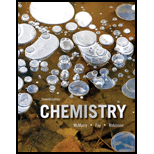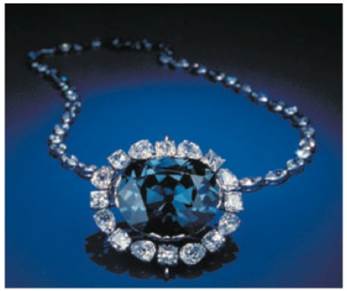
Chemistry (7th Edition)
7th Edition
ISBN: 9780321943170
Author: John E. McMurry, Robert C. Fay, Jill Kirsten Robinson
Publisher: PEARSON
expand_more
expand_more
format_list_bulleted
Concept explainers
Textbook Question
Chapter 1, Problem 1.16A
PRACTICE 1.15 Gemstones are weighed in carats, with 1 carat = 200 mg (exactly). What is the mass in grams of the Hope Diamond, the world's largest blue diamond at 44.4 carats? What is this mass in ounces? (See conversion on the inside back cover.)

APPLY 1.16 A pure diamond has a density of 3.52 g/cm3. Set up a dimensional-analysis equation to find the volume (cm3) of the Hope Diamond (Problem 1.15).
Expert Solution & Answer
Want to see the full answer?
Check out a sample textbook solution
Students have asked these similar questions
Using Benzene as starting materid show
how each of the Following molecules Contel
Ve syntheswed
CHI
9.
b
-50311
с
CHY
503H
Ночто
d.
อ
•NOV
e
11-0-650
NO2
The molecule PYRIDINE,
6th electrons and is therefore aromatre
and is Assigned the Following structure
contering
Since aromatk moleculoy undergo electrophilic
anomatic substitution, Pyridine shodd undergo
The Following reaction
+ HNO3
12504
a. write all of the possible Mononitration Products
that could Result From this reaction
18. Bared upon the reaction mechanison determime
which of these producty would be the major
Product of the hegetion
a. Explain Why electron withdrawing groups
tend to be meta-Directors. Your answer Should
lyclude all apropriate. Resonance contributing
Structures
fo. Explain why -ll is an outho -tura
drccton even though chlorine has a very High
Electronegativity
Chapter 1 Solutions
Chemistry (7th Edition)
Ch. 1 - PRACTICE 1.1 Express the following quantities in...Ch. 1 - APPLY 1.2 Express the following quantities in...Ch. 1 - PRACTICE 1.3 The melting point of table salt is...Ch. 1 - Prob. 1.4ACh. 1 - PRACTICE 1.5 Chloroform, a substance once used as...Ch. 1 - APPLY 1.6 You are beachcombing on summer vacation...Ch. 1 - PRACTICE 1.7 Some radioactive materials emit a...Ch. 1 - Prob. 1.8ACh. 1 - Prob. 1.9PCh. 1 - Prob. 1.10A
Ch. 1 - Prob. 1.11PCh. 1 - Prob. 1.12ACh. 1 - Prob. 1.13PCh. 1 - APPLY 1.14 A sodium chloride solution was prepared...Ch. 1 - PRACTICE 1.15 Gemstones are weighed in carats,...Ch. 1 - PRACTICE 1.15 Gemstones are weighed in carats,...Ch. 1 - Prob. 1.17PCh. 1 - APPLY 1.18 How large, in cubic centimeters, is the...Ch. 1 - Prob. 1.19PCh. 1 - PROBLEM 1.20 Calculate the percentage Of atoms on...Ch. 1 - Prob. 1.21PCh. 1 - Prob. 1.22PCh. 1 - Which block in each of the following drawings of a...Ch. 1 - Prob. 1.24CPCh. 1 - How many milliliters of water does the graduated...Ch. 1 - Assume that you have two graduated cylinders, one...Ch. 1 - The following cylinder contains three liquids that...Ch. 1 - The following statements pertain to the...Ch. 1 - The following statements pertain to the...Ch. 1 - Prob. 1.30SPCh. 1 - Prob. 1.31SPCh. 1 - Prob. 1.32SPCh. 1 - Prob. 1.33SPCh. 1 - Prob. 1.34SPCh. 1 - Prob. 1.35SPCh. 1 - 1.36 What is the difference between mass and...Ch. 1 - Prob. 1.37SPCh. 1 - Prob. 1.38SPCh. 1 - Prob. 1.39SPCh. 1 - Prob. 1.40SPCh. 1 - Prob. 1.41SPCh. 1 - Prob. 1.42SPCh. 1 - Prob. 1.43SPCh. 1 - Prob. 1.44SPCh. 1 - Prob. 1.45SPCh. 1 - Prob. 1.46SPCh. 1 - Prob. 1.47SPCh. 1 - Prob. 1.48SPCh. 1 - Prob. 1.49SPCh. 1 - How many picograms are in 1 mg? In 35 ng?Ch. 1 - Prob. 1.51SPCh. 1 - Prob. 1.52SPCh. 1 - Prob. 1.53SPCh. 1 - How many significant figures are in each of the...Ch. 1 - Prob. 1.55SPCh. 1 - Prob. 1.56SPCh. 1 - Prob. 1.57SPCh. 1 - Prob. 1.58SPCh. 1 - Prob. 1.59SPCh. 1 - Prob. 1.60SPCh. 1 - Prob. 1.61SPCh. 1 - Prob. 1.62SPCh. 1 - Prob. 1.63SPCh. 1 - Prob. 1.64SPCh. 1 - Prob. 1.65SPCh. 1 - Carry Out the following conversions: (a) How many...Ch. 1 - Prob. 1.67SPCh. 1 - Prob. 1.68SPCh. 1 - Prob. 1.69SPCh. 1 - Weights in England are commonly measured in...Ch. 1 - Prob. 1.71SPCh. 1 - Prob. 1.72SPCh. 1 - Prob. 1.73SPCh. 1 - The normal body temperature of a goat is 39.90C...Ch. 1 - Prob. 1.75SPCh. 1 - Prob. 1.76SPCh. 1 - Prob. 1.77SPCh. 1 - Suppose you were dissatisfied with both Celsius...Ch. 1 - Answer parts (a)-(d) of Problem 1.78 assuming that...Ch. 1 - Prob. 1.80SPCh. 1 - Prob. 1.81SPCh. 1 - Prob. 1.82SPCh. 1 - Prob. 1.83SPCh. 1 - Prob. 1.84SPCh. 1 - The density Of silver is 10.5 g/cm3. What is the...Ch. 1 - Prob. 1.86SPCh. 1 - Prob. 1.87SPCh. 1 - Prob. 1.88SPCh. 1 - An experiment is performed to determine if pennies...Ch. 1 - Which has more kinetic energy, a 1400 kg car...Ch. 1 - Prob. 1.91SPCh. 1 - Prob. 1.92SPCh. 1 - Prob. 1.93SPCh. 1 - Prob. 1.94SPCh. 1 - Prob. 1.95SPCh. 1 - Prob. 1.96CPCh. 1 - Lignum vitae is a hard, durable, and extremely...Ch. 1 - Prob. 1.98CPCh. 1 - Prob. 1.99CPCh. 1 - Prob. 1.100CPCh. 1 - Prob. 1.101CPCh. 1 - Answer the following questions: (a) An old rule of...Ch. 1 - A 1.0 ounce piece of chocolate contains 15 mg of...Ch. 1 - Prob. 1.104CPCh. 1 - Prob. 1.105CPCh. 1 - Prob. 1.106CPCh. 1 - Prob. 1.107CPCh. 1 - Prob. 1.108CPCh. 1 - Prob. 1.109CPCh. 1 - Prob. 1.110CPCh. 1 - Prob. 1.111CPCh. 1 - Brass is a copper—zinc alloy. What is the mass in...Ch. 1 - Prob. 1.113CPCh. 1 - The element gallium (Ga) has the second largest...Ch. 1 - Distances over land are measured in statute miles...
Knowledge Booster
Learn more about
Need a deep-dive on the concept behind this application? Look no further. Learn more about this topic, chemistry and related others by exploring similar questions and additional content below.Similar questions
- 9. Write Me product as well as the reaction Mechanism For each of the Following Vanctions +H₂504 4.50+ T C. +212 Fellz 237 b. Praw the potential energy Diagrams For each OF Mese Rauctions and account For any differences that appear in the two potential Puergy Diagrams which of here two reactions 19 Found to be Reversable, Rationalice your answer based upon the venation mechanisms and the potential energy diagrams.arrow_forward9. Write Me product as well as the reaction Mechanism For each of the Following Veritious +H2504 4.50+ + 1/₂ Felly ◎+ 7 b. Praw he potential energy Diagrams For each OF Mese Ronctions and account for any differences that appeak in the two potential Puergy Diagramsarrow_forwardDraw the major product of this reaction. Ignore inorganic byproducts. Incorrect, 3 attempts remaining 1. excess Br2, NaOH 2. neutralizing workup Qarrow_forward
- Given the electrode Pt | Ag | Ag+ (aq), describe it.arrow_forwardAt 25°C, the reaction Zn2+ + 2e ⇄ Zn has a normal equilibrium potential versus the saturated calomel electrode of -1.0048 V. Determine the normal equilibrium potential of Zn versus the hydrogen electrode.Data: The calomel electrode potential is E° = 0.2420 V versus the normal hydrogen electrode.arrow_forwardElectrochemistry. State the difference between E and E0.arrow_forward
- In an electrolytic cell, the positive pole is always assumed to be on the right side of the battery notation. Is that correct?arrow_forwardIn an electrolytic cell, the positive pole is always assumed to be on the right side of the battery. Is that correct?arrow_forwardCalculate the free energy of formation of 1 mol of Cu in cells where the electrolyte is 1 mol dm-3 Cu2+ in sulfate solution, pH 0. E° for the Cu2+/Cu pair in this medium is +142 mV versus ENH.Assume the anodic reaction is oxygen evolution.Data: EH2 = -0.059 pH (V) and EO2 = 1.230 - 0.059 pH (V); 2.3RT/F = 0.059 Varrow_forward
- If the normal potential for the Fe(III)/Fe(II) pair in acid at zero pH is 524 mV Hg/Hg2Cl2 . The potential of the saturated calomel reference electrode is +246 mV versus the NHE. Calculate E0 vs NHE.arrow_forwardGiven the galvanic cell whose scheme is: (-) Zn/Zn2+ ⋮⋮ Ag+/Ag (+). If we know the normal potentials E°(Zn2+/Zn) = -0.76V and E°(Ag+/Ag) = 0.799 V. Indicate the electrodes that are the anode and the cathode and calculate the E0battery.arrow_forwardIndicate the functions that salt bridges have in batteries.arrow_forward
arrow_back_ios
SEE MORE QUESTIONS
arrow_forward_ios
Recommended textbooks for you
 General Chemistry - Standalone book (MindTap Cour...ChemistryISBN:9781305580343Author:Steven D. Gammon, Ebbing, Darrell Ebbing, Steven D., Darrell; Gammon, Darrell Ebbing; Steven D. Gammon, Darrell D.; Gammon, Ebbing; Steven D. Gammon; DarrellPublisher:Cengage Learning
General Chemistry - Standalone book (MindTap Cour...ChemistryISBN:9781305580343Author:Steven D. Gammon, Ebbing, Darrell Ebbing, Steven D., Darrell; Gammon, Darrell Ebbing; Steven D. Gammon, Darrell D.; Gammon, Ebbing; Steven D. Gammon; DarrellPublisher:Cengage Learning Introduction to General, Organic and BiochemistryChemistryISBN:9781285869759Author:Frederick A. Bettelheim, William H. Brown, Mary K. Campbell, Shawn O. Farrell, Omar TorresPublisher:Cengage Learning
Introduction to General, Organic and BiochemistryChemistryISBN:9781285869759Author:Frederick A. Bettelheim, William H. Brown, Mary K. Campbell, Shawn O. Farrell, Omar TorresPublisher:Cengage Learning Chemistry: The Molecular ScienceChemistryISBN:9781285199047Author:John W. Moore, Conrad L. StanitskiPublisher:Cengage Learning
Chemistry: The Molecular ScienceChemistryISBN:9781285199047Author:John W. Moore, Conrad L. StanitskiPublisher:Cengage Learning Chemistry & Chemical ReactivityChemistryISBN:9781337399074Author:John C. Kotz, Paul M. Treichel, John Townsend, David TreichelPublisher:Cengage Learning
Chemistry & Chemical ReactivityChemistryISBN:9781337399074Author:John C. Kotz, Paul M. Treichel, John Townsend, David TreichelPublisher:Cengage Learning Introductory Chemistry: An Active Learning Approa...ChemistryISBN:9781305079250Author:Mark S. Cracolice, Ed PetersPublisher:Cengage Learning
Introductory Chemistry: An Active Learning Approa...ChemistryISBN:9781305079250Author:Mark S. Cracolice, Ed PetersPublisher:Cengage Learning Chemistry: Principles and ReactionsChemistryISBN:9781305079373Author:William L. Masterton, Cecile N. HurleyPublisher:Cengage Learning
Chemistry: Principles and ReactionsChemistryISBN:9781305079373Author:William L. Masterton, Cecile N. HurleyPublisher:Cengage Learning

General Chemistry - Standalone book (MindTap Cour...
Chemistry
ISBN:9781305580343
Author:Steven D. Gammon, Ebbing, Darrell Ebbing, Steven D., Darrell; Gammon, Darrell Ebbing; Steven D. Gammon, Darrell D.; Gammon, Ebbing; Steven D. Gammon; Darrell
Publisher:Cengage Learning

Introduction to General, Organic and Biochemistry
Chemistry
ISBN:9781285869759
Author:Frederick A. Bettelheim, William H. Brown, Mary K. Campbell, Shawn O. Farrell, Omar Torres
Publisher:Cengage Learning

Chemistry: The Molecular Science
Chemistry
ISBN:9781285199047
Author:John W. Moore, Conrad L. Stanitski
Publisher:Cengage Learning

Chemistry & Chemical Reactivity
Chemistry
ISBN:9781337399074
Author:John C. Kotz, Paul M. Treichel, John Townsend, David Treichel
Publisher:Cengage Learning

Introductory Chemistry: An Active Learning Approa...
Chemistry
ISBN:9781305079250
Author:Mark S. Cracolice, Ed Peters
Publisher:Cengage Learning

Chemistry: Principles and Reactions
Chemistry
ISBN:9781305079373
Author:William L. Masterton, Cecile N. Hurley
Publisher:Cengage Learning
Measurement and Significant Figures; Author: Professor Dave Explains;https://www.youtube.com/watch?v=Gn97hpEkTiM;License: Standard YouTube License, CC-BY
Trigonometry: Radians & Degrees (Section 3.2); Author: Math TV with Professor V;https://www.youtube.com/watch?v=U5a9e1J_V1Y;License: Standard YouTube License, CC-BY